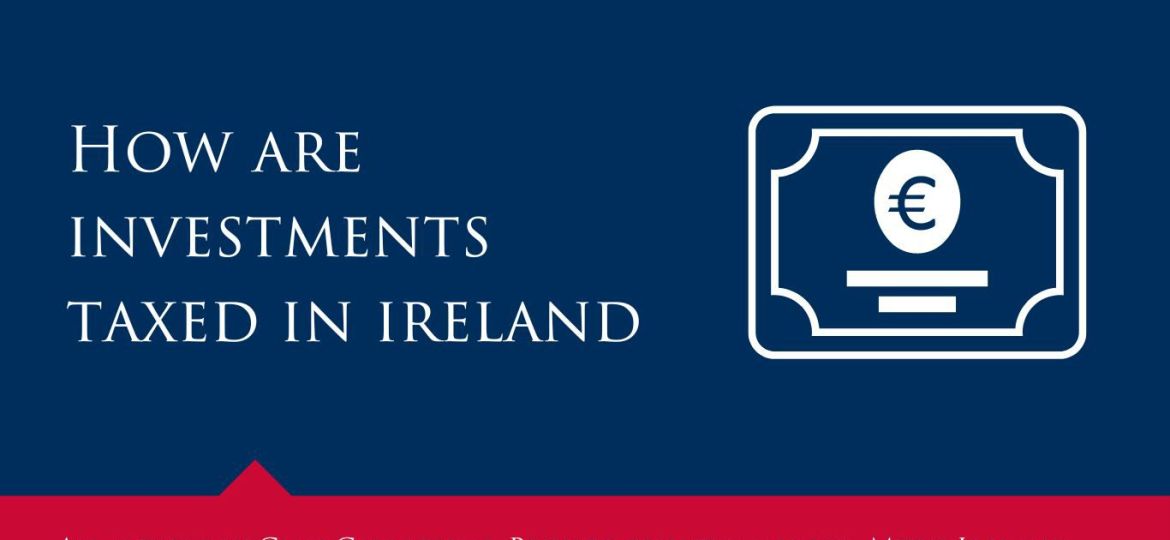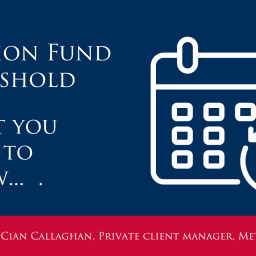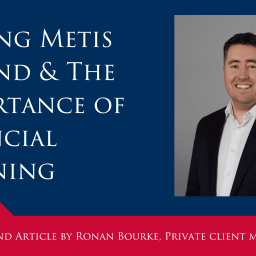
We’re often asked, ‘How are Investments Taxed in Ireland?’
Its always important to understand how investments are taxed in Ireland before investing your hard earned wealth. For the majority of investors in Ireland there are three main forms of Tax you need to understand:
CAPITAL GAINS TAX (CGT)
Gains on the sales of certain assets such as shares in a company or a property are charged at 33%.
- There’s an annual exemption of €1,270 which means you can crystalise gains of this amount every year without paying tax.
- You can write off previous capital losses against future gains.
- The tax is self-assessment, you need to file a tax return in the year you make the gain.
INCOME TAX
- If you receive rental income from a property or Dividend income from shares this is taxed as income at your marginal rate.
- This can also be subject to PRSI and USC
- Again, this is self-assessment and you need to file a tax return each year.
EXIT TAX
- Exit Tax is applied to most investment Funds and ETFs
- The current rate of tax is 41% on the gains.
- This is levied when you withdraw money from the fund or policy and on each 8th anniversary.
- You can invest in accumulating funds, which means that dividends that are automatically reinvested in the fund and not considered to be taxable income in your hands.
- If you invest through an insurance policy the tax can be deducted at source and remitted to revenue by the provider.
On the face of things, CGT is much more attractive than Exit tax, but this is only one part of an investment you need to consider.
To further understand how investments are taxed in Ireland, when it comes to investing, we have 3 pillars that we base our portfolios on: cost efficiency, tax efficiency and diversification.
All three of these play an important role in any investment strategy. And when investing through a pension in Ireland, we can use all three to make sure you have a highly competitive investment strategy in line with your Metis LifePlan.
However, this becomes a lot more difficult when we’re talking about non-pension investments. As I see it, you can only have two of the three at any one time in Ireland.
DIVERSIFICATION
When we say diversification, we mean buying into the global stock market (thousands of different business) rather than buying individual stocks or one property.
We’re evidence-based investors, so we only invest in things that we know will work and have a long-term track record. Buying the great companies of the world and letting them do what they do will work. You can read more here about why the stock market always goes up in the long run.
Any step you take that moves you away from investing in the great companies of the world increases the risk that your investment strategy may not work
Some common examples of investments that may or may not work are:
Direct property
Individual share dealing
Commodities
Cash on deposit
Structured products
Loan notes
Gold
Crypto
Just about any investment that sounds too good to be true
We avoid recommending these at Metis Ireland, we stick with what the evidence tells us will work – buying index funds/instruments that track the performance of the global stock market.
This will give you a real return above inflation and it will ensure that you don’t outlive your money. There’s a relatively low risk of permanent capital loss, as it’s extremely unlikely that your investment value will ever plummet to zero – every investor’s worst nightmare.
COST EFFICIENCY
We use this term very much intentionally; we did not say cheap or low cost. Cost is what you pay, value is what you get.
When it comes to advice, the evidence tells that paying for expert advice is worth its weight in gold. What I mean here is, if you are paying for an investment, you of course need to get value for money. But paying for an investment product without getting financial advice and a real financial plan is fraught with risk.
If you invest with a real financial planning firm, you will get a bespoke financial plan, ongoing service and advice, and your investment product at roughly the same price as you would get an investment product on its own from a bank or directly with an insurance company. In most cases, it also works out a lot cheaper than some of the larger private wealth managers.
So, what is good value? Well, this all comes down to your personal situation, your own experience as an investor, and if you want to someone to manage your investments for you. But to put a figure to it, provided you are getting great service, objective advice and real financial planning, anywhere between a 1% to 1.5% fee would be really good value.
If you’re paying the same as this without advice and a plan, I personally don’t see how this could be construed as good value.
If you are paying more than this well, you would want to be certain of the value you are getting.
Trades Offs
The ideal scenario here would be if we could buy low-cost index funds and have them taxed with CGT. However, this simply isn’t possible. To avail of a CGT investment, you lose out on diversification (property or individual shares) which we don’t think is worth it.
You can potentially get around losing out on diversification by investing through investment trusts or some discretionary fund managers. However, these tend to be much more expensive, so you’d lose out on cost efficiency. These investments often cost around 2-3% per annum all in and you usually don’t get a financial plan as part of this service.
Our research suggests that if you’re paying an additional 0.5% per annum to access CGT instruments, it erodes almost all the tax savings, assuming returns are the same.
What next?
All we can do is control the controllable. We can choose a diverse investment strategy and we can control costs. We don’t control tax law in Ireland. The laws and regulations can change very fast depending on who’s in power and what’s going on in the world.
So, our advice is this:
- Seek advice for your set of circumstances
- Make sure it’s with a real financial planner
- Buy the great companies of the world
- Make sure that if you are paying for something you’re getting value for money
- Don’t let the ever-changing tax landscape derail you long term investment strategy
If you’d like to discuss anything I’ve covered in this article, or your investment strategy, or are interested in a financial plan, please don’t hesitate to give us a call on 01 908 1500 or email us at info@metisireland.ie.
Cian Callaghan CFP®
Director – Private Clients
Disclaimer:
Metis Ireland is not a tax advisor. You should always speak to a qualified tax advisor or accountant for guidance on how investments are taxed in Ireland specific to your case.
Disclaimer
Metis Ireland Financial Planning Ltd t/a Metis Ireland is regulated by the Central Bank of Ireland.
All content provided in these blog posts is intended for information purposes only and should not be interpreted as financial advice. You should always engage the services of a fully qualified financial adviser before entering any financial contract. Metis Ireland Financial Planning Ltd t/a Metis Ireland will not be held responsible for any actions taken as a result of reading these blog posts.
















